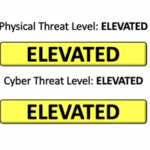
Faith-Based Daily Awareness Post 3 October 2025
Faith-Based Security Headlines
These updates are shared to help raise the situational awareness of Faith-Based organizations to best defend against and mitigate the impacts from all-hazards threats including physical security, cybersecurity, and natural disasters.
‘Always a bit on edge.’ How religious leaders are confronting wave of violence
Religious institutions across the U.S. are bracing for escalating violence by sharply intensifying security measures. According to the USA Today report, churches, mosques, synagogues, and other HOWs are installing reinforced doors and windows, adding surveillance systems and ballistic protection, and upgrading perimeter defenses. They’re also investing in training staff and congregants in active-shooter response, medical triage, and de-escalation techniques. Underlying these changes is a rising tide of targeted attacks in recent years, prompting faith communities and security experts alike to reexamine long-standing assumption about openness and safety in religious spaces.
Analyst Comments: The USA Today report shows how faith communities are being forced to balance openness and inclusivity with hardening measures traditionally associated with government or corporate facilities. The widespread adoption of reinforced doors, surveillance, and active-shooter training reflects a recognition that religious institutions are increasingly viewed as soft targets by extremists and violent actors. HOWs may consider combining physical barriers with trained personnel, emergency preparedness, and partnerships with local law enforcement.
Protecting Our Churches from Cyber Threats
The “Protecting Our Churches from Cyber Threats” article emphasizes that places of worship are not exempt from growing risks of phishing, malware, ransomware, and data breaches. Handling sensitive personal and financial data of congregants makes HOWs attractive targets, and an incident can entail financial losses, legal exposure, and damage to trust. This article views cybersecurity as not just a technical issue but as an ethical duty and stewardship responsibility that HOWs face when protecting their digital assets and their communities.
Analyst Comments: The author recommends a set of foundational practices that every congregation can adopt, including education and awareness, use of strong passwords and multifactor authentication. The author also encourages encrypting sensitive data, caution in social media usage, avoiding unsecured public Wi-Fi and charging stations, keeping security software and systems updates, and regular backups.
Cyber Threat Information Sharing at Risk: What Companies Should Consider if the Cybersecurity Information Sharing Act of 2015 Is Not Renewed
As of October 1st, the liability shields and safe harbors under the Cybersecurity Information Sharing Act (CISA) 2015 have lapsed. Since its enactment, CISA 2015 enabled private companies and government agencies to share threat intelligence more freely by reducing legal risk, protecting participants from civil liability, antitrust exposure, FOIA demands, regulatory enforcement, and privilege waiver via properly shared cyber-threat data. The Washington Post reports that only about 35 percent of its staff remain on duty though additional personnel may be activated for emergencies. With those protections gone, organizations now face a sharp legal calculus: sharing useful threat indicators may expose them to lawsuits, regulatory scrutiny, or antitrust concerns, especially in sectors where competitive sensitivity is high. The lapse threatens to undercut much of trust and momentum built among Information Sharing and Analysis Centers (ISACs) and public-private cyber defense partnerships. As Congress debates how or if reinstating CISA-like protections, the U.S. faces increased fragmentation and risk in its collective cyber defense posture.
Analyst Comments: To mitigate the fallout, affected organizations should consider reevaluating their existing sharing practices, consider alternate threat intelligence sources, revisit nondisclosure and contractual protections, strengthen data minimization techniques, and engage in more informal or controlled peer forums rather. As always, the FB-ISAO remains a consistent partner for the faith-based community and is able to redact identifying information for any intelligence that organizations desire to share with the federal government.
More Faith-Based Stories
- Former member of Colorado’s Crossroads Church accused of sending threatening messages, “Maybe today the bomb goes off”
- Robert Morris, Texas megachurch pastor, pleads guilty to sexually abusing a child
- MI5 and counter-terror police on heightened alert after synagogue attack
- One of victims killed in Manchester synagogue attack was hit by police gunfire, chief constable says
- Guterres condemns deadly terror attack targeting Manchester synagogue
- CISA 2015 sunsets: Cyber Threat sharing without a net?
- What to know about Trump’s latest federal deployments in Memphis, Portland and other US cities
- What we know so far about the National Guard deployment in Portland
- ‘Hey, you found my manifesto’: 14-year-old boy’s plan for a ‘massacre’ at high school included color-coded maps with ‘potential targets,’ police say
- A battlefield tech upgrade led by Trump allies is deeply flawed: Army memo
- What’s next after Imelda? Two areas being monitored in tropics, including one near Florida
- Trump says US is in ‘armed conflict’ with drug cartels after ordering strikes in the Caribbean
More Security-Focused Content

The FB-ISAO’s sponsor Gate 15 publishes a daily newsletter called the SUN. Curated from their open source intelligence collection process, the SUN informs leaders and analysts with the critical news of the day and provides a holistic look at the current global, all-hazards threat environment. Ahead of the daily news cycle, the SUN allows current situational awareness into the topics that will impact your organization.


